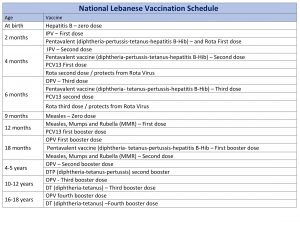If you are a refugee or asylum-seeker, you can access subsidized primary healthcare from supported primary health care centers.
1. I am a refugee or asylum-seeker. Can I go to a doctor to access healthcare?⬇️
Yes. If you are a refugee or an asylum-seeker, you can see a doctor at a primary health care center. (See Question 2 for the list of centers).
2. Where are the primary health care centers located?⬇️
You can access the list of health sector partners supported primary health care centers through the links below.
➡️Bekaa
➡️North
➡️South
3. What types of services can I receive at primary health care centers?⬇️
You can receive the following type of services and medical consultations:
- Maternal and childcare (vaccination for children, antenatal care, postnatal care, family planning, counselling on infant and young child feeding including the importance of breastfeeding, and screening for malnutrition and treatment, etc.)
- Treatment for acute illness (cold, cough, fever, headache or any pain, i.e., backpain, joint pain, skin irritation, rash, etc.)
- Treatment for chronic diseases (epilepsy, diabetes, hypertension, cardio-vascular diseases, etc.)
- Mental health services
- Diagnostic services (laboratory tests and X-Rays, ultrasounds, etc.)
- Dental care
4. How much do I have to pay for a medical fee at a primary health care center?⬇️
You will be charged a consultation fee ranging from 30,000 LBP to 400,000 LBP.
Please see below the cost for each type of service at primary health care centers.
Vaccines: Free of charge.
Acute medications: Free of charge.
Chronic medications: Handling fee per visit.
Family planning and postnatal care: Free of charge.
Dental care: Please check the fee at the primary health care center.
Laboratory and diagnostic tests: Reduced cost or free of charge.
5. Can my children receive vaccinations in Lebanon? If so, where?⬇️
Yes. Your children can receive vaccinations at primary health care centers or UNHCR reception centers free of charge. Children will be also provided with supplements such as Vitamin A.
The first vaccination dose for Hepatitis B will be given at birth at the hospital free of charge. Please make sure that your children receive it on time.
Please check the national Lebanese vaccination schedule (Question 6), and the mobile vaccination schedule here.
6. What vaccinations should my children receive?⬇️
Please see below the list of vaccinations required for children according to their age.

7. I have a chronic disease. What treatment can I get?⬇️
If you have a chronic disease such as diabetes, cardiac conditions, hypertension, asthma or epilepsy, you should go see a doctor at a primary health care center.
📢Attention! 📢 UNHCR does not cover the cost of treatment for chronic diseases that require repeated hospitalization, such as cancer, thalassemia or kidney dialysis. Some non-government organizations may provide support for similar conditions. For more information, please reach out to a primary health care center.
8. I have a child/ family member with specific needs, what kind of support and services are available?⬇️
Various community support services are available for persons with disabilities or specific needs. You can request a consultation at the nearest primary health care center to know more.
For information about available rehabilitation services in your area, you may ask if the following services are available at the primary health care center:
- Physical and functional rehabilitation
- Caregivers training
- Mobility assistive devices, protheses and orthosis
- Psychosocial services for rehabilitation
- Ergotherapy
- Physiotherapy
- Speech therapy
9. I am pregnant. What services can I access?⬇️
If you are pregnant, you can access to the following maternity services at primary health care centers.
- Pregnancy care (antenatal care, postnatal care, breastfeeding awareness, family planning counselling)
- Laboratory tests
- Diagnostic tests
- Ultrasounds
- Provision of supplements
Please note that you should go to a primary health care center at least 4 times before you give birth.
You will be provided with a pregnancy card. You will have to keep it with you each time you come for a doctor’s visit and when you come to the hospital to deliver your baby.
10. I am about to give birth, where should I deliver my baby?⬇️
UNHCR advises you to give birth in a UNHCR contracted hospital, this is safest for the mother and her newborn. In the hospital you will receive healthcare from a qualified medical team and in case you or your baby have a health emergency you will receive immediate emergency care to avoid complications including fatal outcomes for you and your baby. Giving birth outside a UNHCR contracted hospital may put you and your baby’s life at risk.
If you give birth with an unauthorized midwife, you may face challenges in registering the birth of your baby later on. Please visit this page to know more about how to register the birth of your newborn baby.
Please be aware that UNHCR does not financially support childbirth at home, or at clinics and hospitals that are not supported by UNHCR.
11. After I give birth, what services can I have access to?⬇️
After you give birth, you can access the following healthcare services at primary health care centers:
- Postnatal care, family planning and counselling,
- Breast-feeding awareness sessions, and
- Hygiene awareness sessions.
It is important that you visit a primary health care center one month after you give birth to receive postnatal care. The medical team will offer you family planning, counselling, and related services.
After having a baby, it is recommended to wait at least 3 years before becoming pregnant again. This helps to prevent premature birth as well as death of newborn babies and protects the health of mothers. Do not put the health of babies and their mothers at risk.
Please seek post-natal care and family planning services in one of the supported primary health care centers. Post-natal care is offered free of charge.
